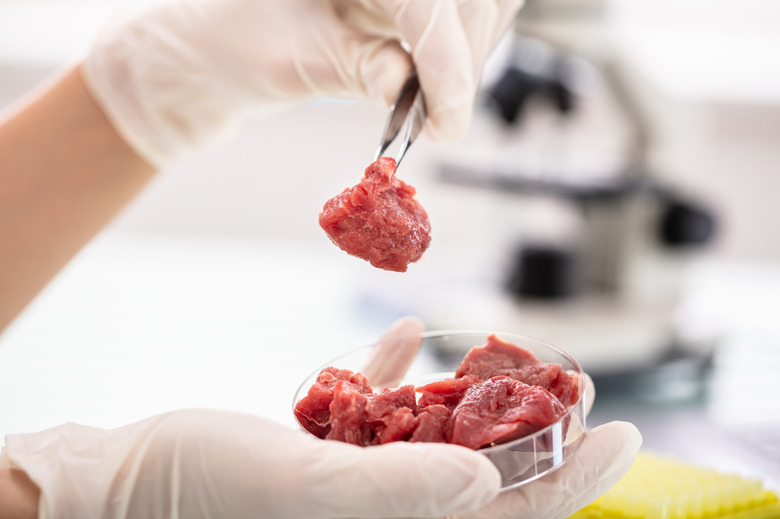Lab-Grown Meat: Delicious Alternative Or Nightmare?
What if you could grow meat in a laboratory without harming any animals – and feed millions of people with this inexpensive, delicious alternative? Scientists at the Harvard John A. Paulson School of Engineering and Applied Sciences (SEAS) are one step closer to making lab-grown meat a staple at your dinner table.
Steak from a Lab
Steak from a Lab
Researchers want to create lab-grown meat that is similar in texture, taste and appearance to real meat from an animal. Not only would it be an environmentally friendly and ethical alternative, lab-grown meat would also be sustainable and reproducible around the globe.
At Harvard, scientists grew "rabbit and cow muscle cells on edible gelatin scaffolds" to create a more realistic product. The gelatin fibers added texture and mimicked the skeletal muscle found in animals. Their goal was to make meat that resembled steak instead of a hamburger patty.
"Muscle cells are adherent cell types, meaning they need something to hold onto as they grow. To grow muscle tissues that resembled meat, we needed to find a 'scaffold' material that was edible and allowed muscle cells to attach and grow in 3-D. It was important to find an efficient way to produce large amounts of these scaffolds to justify their potential use in food production," Luke MacQueen, one of the researchers, told the Harvard Gazette.
After showing that scaffolds can make lab-grown meat more realistic, the scientists plan to continue their research and develop better products. The cow and rabbit muscle cells they grew aren't ready for human consumption, so it may be a while before you can buy this type of meat in the grocery store.
Is it Vegan?
Is it
Vegan?
One question that frequently comes up during discussions about lab-grown meat is, "Can you consider it vegan?" Critics say it's not vegan because it requires stem cells from animals to start the process in the laboratory. Since it's supposed to mimic real meat, they believe that lab-grown steak or pork chops can never be considered vegan. Instead, they point to plant-based meat substitutes as a better option.
Supporters argue that lab-grown meat is a cruelty-free alternative that doesn't harm living animals since scientists can harvest cells without killing animals. It eliminates the need to keep and feed large numbers of animals for slaughter. It also gets rid of problems like manure pollution and diseases spread by livestock. Over time, production of lab-grown meat could increase to the point that it becomes an affordable way to feed millions of people.
Taste Test
Taste
Test
When Mark Post revealed the first lab-grown beef burger in 2013, a food scientist complained that the meat wasn't juicy or soft enough. Although it resembled meat, it was still possible to tell that the burger in front of him wasn't real.
That first burger cost $330,000 to make, so it's not the type of meal you can quickly grab at the local supermarket. Nevertheless, it served as a proof of concept that lab-grown meat could become edible one day.
Since 2003, researchers and companies have continued to work on lab-grown meat. Not only do they have to reduce costs significantly to make the product viable commercially, but they also have to make it taste good. It may be easier to lower the price than to make a lab-grown steak palatable.
Despite the potential environmental and ethical benefits, the taste of lab-grown meat will determine its future. One study found that 47% of Americans who visit restaurants consider themselves foodies, and this number is growing. And foodies won't settle for a product that mimics meat in appearance but lacks the taste.
References
- The New York Times: Growing Meat in a Lab That Doesn't Look Like Mush
- Scientific American: Lab-Grown Meat
- Harvard Gazette: Real Texture for Lab-Grown Meat
- Nature: Muscle Tissue Engineering in Fibrous Gelatin: Implications for Meat Analogs
- Slate: Meat for Meat's Sake
- Mintel: Half of American Restaurant Goers Consider Themselves Foodies
Cite This Article
MLA
Bandoim, Lana. "Lab-Grown Meat: Delicious Alternative Or Nightmare?" sciencing.com, https://www.sciencing.com/lab-grown-meat-13722698/. 6 November 2019.
APA
Bandoim, Lana. (2019, November 6). Lab-Grown Meat: Delicious Alternative Or Nightmare?. sciencing.com. Retrieved from https://www.sciencing.com/lab-grown-meat-13722698/
Chicago
Bandoim, Lana. Lab-Grown Meat: Delicious Alternative Or Nightmare? last modified March 24, 2022. https://www.sciencing.com/lab-grown-meat-13722698/
